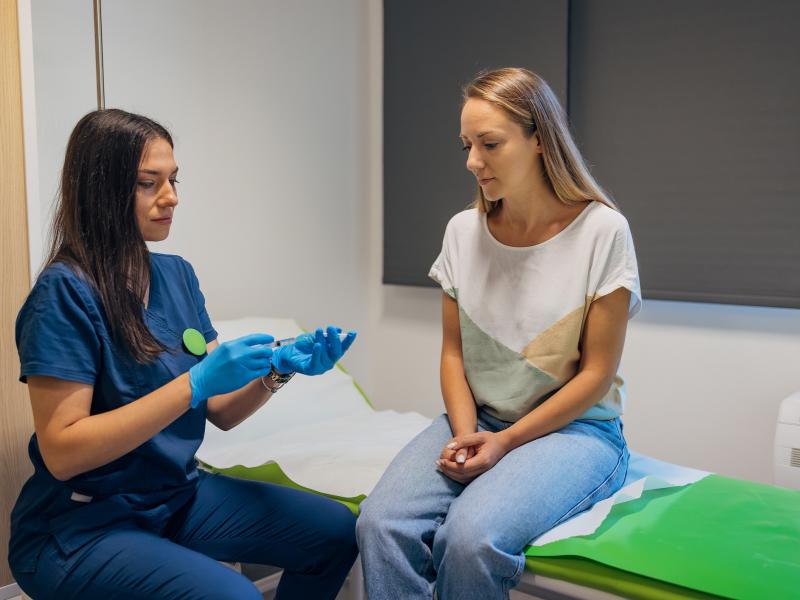Pregnancy cravings often begin in the first trimester as hormonal shifts influence taste and smell...
Read More
Menopause is a natural shift that doesn’t have to feel overwhelming. Our experienced OB/GYN specialists can guide you through this transition with understanding and personalized care, helping you embrace change and live life to the fullest.
Menopause is part of a natural aging process that marks the end of your menstrual cycles and fertility. It’s part of a journey with three distinct stages: perimenopause, menopause and postmenopause.
is the transitional period leading up to menopause, typically starting in your 40s but sometimes occurring as early as your late 30s. During this time, your ovaries gradually produce less estrogen and progesterone, the hormones that regulate menstruation and fertility. This hormonal shift can cause irregular menstrual cycles, with periods becoming shorter or longer, lighter or heavier.
is diagnosed after 12 consecutive months without a menstrual period. This stage signifies the permanent end of menstruation and fertility. The ovaries no longer release eggs, and estrogen and progesterone levels remain consistently low. As a result, your menstrual periods cease. The average age of menopause in the United States is 51 years, but it can happen earlier or later.
is the stage following menopause, lasting for the rest of your life. During postmenopause, your hormones stabilize at low levels, and while some menopausal symptoms may ease, others, like vaginal dryness or increased risk of osteoporosis, may persist.
Menopause causes a variety of symptoms that can vary in intensity and duration. Symptoms may include:
If you experience these symptoms, talk to your doctor to determine the best approach to managing menopause and maintaining your overall health and well-being.
Diagnosing menopause involves reviewing your symptoms and medical history and confirming you have not had a menstrual period for at least 12 consecutive months. Your doctor may also conduct a physical examination and order blood tests to measure hormone levels, including follicle-stimulating hormone (FSH) and estrogen levels, which fluctuate during perimenopause and decline during menopause. These tests help confirm the hormonal changes associated with menopause and rule out other possible causes of irregular periods or similar symptoms.


Non-hormonal treatment options include antidepressant medications to manage hot flashes and mood swings; gabapentin, an anticonvulsant therapy that can help reduce the frequency and intensity of hot flashes; and vaginal moisturizers and lubricants to help alleviate dryness.

BHRT uses processed hormones designed to mimic the body’s natural hormones to relieve menopausal symptoms. Depending on your symptoms, your provider may suggest a combination of estradiol, progesterone or testosterone. Biomedical hormones may be taken via pill, patch, cream, gel, shots or implanted pellets. BHRT is safe and effective for most women in menopause and perimenopause.

HRT involves taking estrogen alone or with progesterone to relieve menopausal symptoms like hot flashes and vaginal dryness.

Maintaining a balanced diet, exercising regularly and getting enough sleep can help you effectively manage menopausal symptoms like hot flashes and mood swings and support your overall health during this phase of life.
At Inspira, we understand that menopause is a significant life transition that can affect each individual differently. We believe in shared decision-making, where you are actively involved in choosing the treatment approach that aligns with your preferences and goals. Together, we can create a personalized plan that supports your health and well-being during this transformative time.
Beyond comprehensive treatment options, we provide ongoing support and education throughout your menopausal journey. We are here to answer your questions, address any concerns and offer guidance to help you navigate this phase of life.
Menopause typically happens in your 40s or 50s, with the average age in the United States being 51. Perimenopause, the transitional phase leading up to menopause, can begin several years earlier. The timing varies for each person based on genetics, lifestyle and overall health.
Once menopause is confirmed, pregnancy is highly unlikely. However, it's important to note that during perimenopause, when menstrual cycles are irregular, pregnancy can still happen.
On average, hot flashes can last from a few months to several years during perimenopause and menopause. Some people experience occasional hot flashes, while others have them multiple times a day. Managing triggers like stress, caffeine and alcohol and discussing treatment options with your doctor can help alleviate their intensity and frequency.
HRT can alleviate menopausal symptoms like hot flashes and vaginal dryness by replacing estrogen and sometimes progesterone. Benefits may include improved quality of life and reduced risk of osteoporosis. However, HRT also carries risks, including increased risk of blood clots, stroke, breast cancer and cardiovascular disease, especially with long-term use. Talk about your concerns, health history and preferences with your doctor so they can help you weigh the risks and benefits of this treatment option and make an informed decision.
During menopause, the decline in estrogen levels can lead to accelerated bone loss, increasing the risk of osteoporosis and fractures. Maintaining adequate calcium and vitamin D intake through diet and supplements and regular weight-bearing exercise can help support your bone health. Your doctor may also recommend bone density screenings and, if necessary, medications to prevent or manage osteoporosis.

Pregnancy cravings often begin in the first trimester as hormonal shifts influence taste and smell...
Read More
Dysphoric milk ejection reflex (D-MER) is a condition that causes sudden negative emotions during...
Read More
Polycystic Ovary Syndrome (PCOS) affects millions, yet many misconceptions still surround this...
Read More